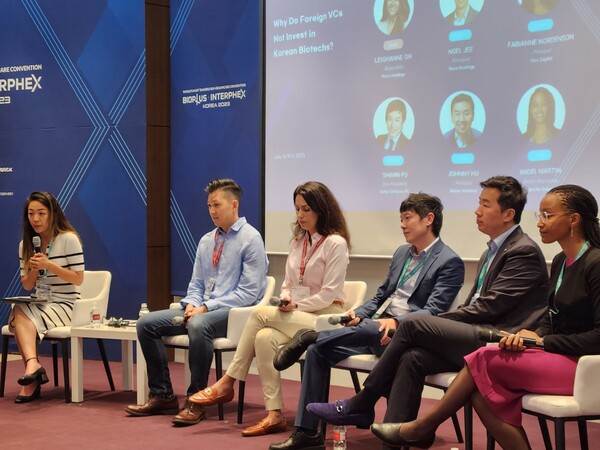Experts from U.S. venture capitals (VCs) cited overvaluation, lack of access, and management issues as reasons for not investing in Korean pharmaceutical companies on the last day of Bioplus-Interphex in Seoul.

The most common issue highlighted by all panelists was the inflated valuation of assets of Korean biotech firms based on their stage of development, compared to U.S. companies.
“The science is impressive and the caliber of innovation is comparable to what we see in the U.S. and the EU but ultimately paying a premium of three times more makes it harder to engage with Korean companies as it offers comparatively smaller returns on investment,” said Noel Jee, Growth Principle at Novo Holdings.
Angel Martin, Senior Associate at Frazier Life Sciences, also chimed in based on her recently conducted due diligence on a Korean company.
“Although the company was developing a hot asset, there was a disconnect in the amount we were willing to offer,” expressed Martin.
Underscoring the need for additional dialogues to bridge the valuation gap, she went on to explain, “We focus on developing the asset so the invested money should not be valued as a company investment but more as an asset investment."
Martin cited the recent global licensing deal between Daewoong Pharmaceutical and Aditum Bio in April involving an oral autoimmune therapy as a sign of future partnerships for the Korean bioindustry.
Still, the panelists pointed out Korea's strengths in conducting early-stage drug development very affordably for $10 to $15 million compared to $50 to $100 million in the U.S., with a tendency to license out for later clinical development.
However, they advised that this strategy is not attractive to investors, and suggested that Korean companies adopt a strategy of keeping their lead assets in-house and licensing out other assets to boost the strength of their investment portfolios for VCs.
Fabienne Nordenson, Private Investments Principal at Vivo Capital, noted that companies should be wary of highlighting their diversified pipelines, as this could be seen as a sign of a lack of focus and could discourage investors.
She explained that a diversified pipeline is not a capital-efficient growth strategy, as there is limited synergy between developing different modalities and indications.
A lack of familiarity and access to Korean companies was also mentioned in the conversation.
However, they noted that this narrative is changing as Korean biotechs are starting to dominate the major conferences, bringing some of the largest delegates to conferences like J.P. Morgan Healthcare Conference and the BIO International Convention in Boston earlier this year.
Shawn Fu, HC Investment Vice President at Vertex Ventures, also criticized the management structure of Korean companies.
“In the U.S., it is common for biotech founders to hire a professional CEO to run the company and instead stay on as scientific advisory board members,” he said.
However, he said the opposite was true for Korean companies.
“If we decide to invest in the company, we need to make sure your attention is not split between conducting research and the day-to-day functioning of the company,” Fu stated.
Leighanne Oh, Growth Team Associate at Novo Holdings, emphasized that a key factor for future investment in Korean companies would be their demonstration of a strong understanding of both the Korean and U.S. reimbursement markets and the corresponding regulatory environments.

